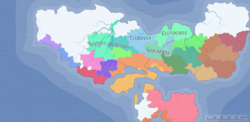Chiresh: Difference between revisions
m (→Consonants) |
m (→Vowels) |
||
| Line 78: | Line 78: | ||
! [[w:Relative_articulation#Mid-centralized vowel|Centralized]] | ! [[w:Relative_articulation#Mid-centralized vowel|Centralized]] | ||
! [[w:Back vowel|Back]] | ! [[w:Back vowel|Back]] | ||
|- | |- | ||
! align="left"|[[w:Close vowel|Close]] | ! align="left"|[[w:Close vowel|Close]] | ||
Revision as of 13:04, 3 July 2020
| Chiresh | |
|---|---|
| Čireš | |
 | |
| Pronunciation | [/.ˈt͡ʃi.rɛʂ/] |
| Created by | Raistas |
| Setting | planet Liifam |
| Ethnicity | Čiyišĕn |
Settameric languages
| |
Early form | |
The Chiresh language (Čireš) is a Plains Settameric language spoken by the people, who live in the southwestern plains of the Northern continent. It belongs to the West Plains languages together with Kootayi and Kalyah, but is quite different from both. It is the southermost West Plains language of all three. It is also the only surviving member of the Plains branch of Settameric languages that preserves the original phoneme *r. This and other phonological features (such as vowel metaphony or umlaut and reduced vowels) make it more similar to the Mountains languages to the west. Thus Chiresh is the most distinctive of the Plains languages, however its grammar stays quite similar to other languages of this branch. Some scholars tend to consider it a link between Western and Eastern language groups.
History
Chiresh had probably originated from the same place, where it is spoken nowadays, and for centuries its native speakers lived a sedentary lifestyle unlike their western neighbours - the Miire people, who had mostly been semi-nomadic. Chiresh is distinctive in a few ways of how some of its consonants developed from a Proto-Plains dialect, in particular *θ, *ł, *s and *j which became /r/, /l/, /x/ and /ɕ/ respectively in modern Chiresh. Also *ny becomes /j/ (as in Kalyah), while *ly is preserved as /t͡ʃ/ (as in Kootayi, where it became /t͡s/).
Phonology
Consonants
The consonants are the following:
| Bilabial | Dental | Postalveolar | Palatalized | Velar | |
|---|---|---|---|---|---|
| Nasal | m | n | |||
| Stop | p | t | k | ||
| Fricative | s | š /ʂ/ | ś /ɕ/ | x /x/, ([ɣ]) | |
| Affricate | č /t͡ʃ/ | ||||
| Approximant | w [ʋ] | l | r | y /j/ |
Geminate consonants can occur word-medially, but they are not separate phonemes and belong to different syllables. The fricatives /x/ is voiceless but become voiced in intervocalic position. For example, śax "berry" is pronounced [ˈɕax], but raxun [ˈra.ɣun] "great". However, geminate "x" does not undergo this lenition. Some consonants also become palatalized before and occassionally after front vowels: /k/, /x/ become [t͡ʃ] and [ʂ] respectively (/x/ can also become [ɕ] before /i/). The phoneme written "w" is usually pronounced [ʋ], but many dialects preserve an older pronunciation of [w], while those few, that have [f], change "w" to a fricative [v] and often devoice word-initially.
Vowels
| Front | Centralized | Back | |
|---|---|---|---|
| Close | i [i] | u [ʉ] | |
| Mid | ö [ø] | ĕ [ɘ~ɤ] | o [o~u] |
| Open-Mid | e [ɛ] | ă [ɛ] | å [ɔ] |
| Open | a [ɑ] |
Southeastern dialects keep "u" as a back vowel [u], which is distinct from [o], while most dialects to the north centralize it to [ʉ] and also have a separate vowel [ɔ], which is pronounced the same way as "a" in almost all dialects to the south and east from the hilly Hallu region. And some dialects have centralized their "u", but have no "o"-like sounds, raising [o] to [u]. This however, does not prevent mutual intelligibility between all dialects of Chiresh. Additionally, "o" or "å" occur in loanwords. The vowels written "ĕ" and "ă", are centralized and reduced, thereby differing in quantity from the rest. In unstressed positions, they often resemble a schwa and in some dialects they tend to be dropped word-finally. The vowel "ĕ", especially when stressed, may be somewhat rounded and sound as [ɵ], similar to "ö", though they do not merge in any dialect.